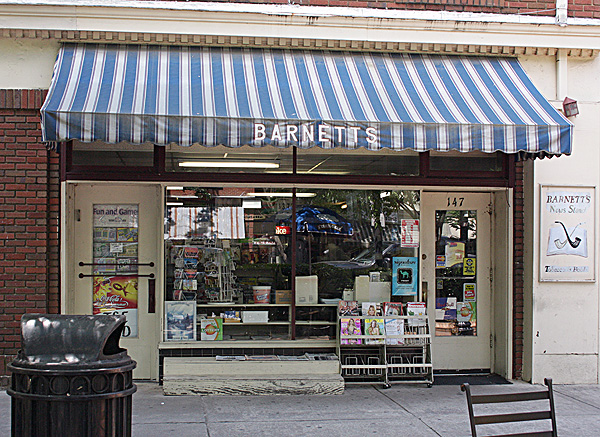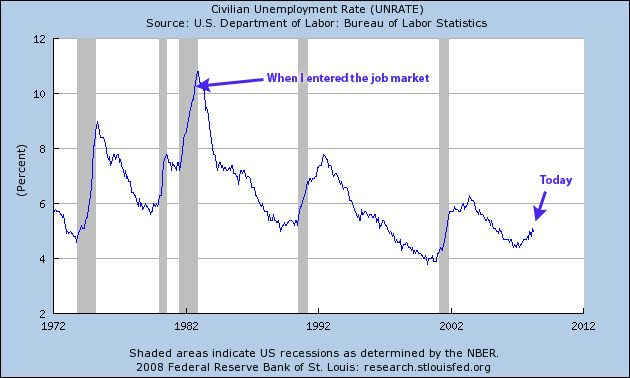|
||||
 Daily Notebook 




|
|
2008 May 29-31 |
Zillow? The value of my house as estimated by Zillow keeps shooting up. They now say it has risen more than 5% in the past 30 days. Query: Does Zillow's computer keep raising the appraisal because I keep looking at it, and they think I'm somebody wanting to buy it? The Year 2012 Problem Remember the Year 2000 Problem? (And all the disasters it didn't cause?) Here's something weirder. Apparently, people of a superstitious bent are going around convincing themselves that the world will end in 2012 because that's the year the ancient Mayan calendar runs out of digits. Folks, a date on the calendar is not a physical event. |
|
|
|
2008 May 28 |
Omega Centauri from a fixed tripod
Omega Centauri is the brightest globular cluster in the sky, but as seen from Georgia, it barely clears the southern horizon. (Go to Australia to see it really well.) This is a single 5-second exposure at ISO 1600 with a Canon 40D and a Sigma 105/2.8 lens, wide open. The streakiness and grain are due to imperfections in the camera sensor, greatly magnified by postprocessing to bring out the stars. Omega is the fuzzball at the bottom. |
|
|
|
2008 May 27 |
Puffer fish
The latest addition to Cathy's aquarium is a puffer (blowfish). Puffers have unusual, dog-like, expressive faces. They move their eyes a lot and look around, mostly forward. This one is smart enough that he has learned to recognize when Cathy is going to clean up his leftover food; he hides it when he sees her coming. Why I don't like zoom lenses
Notice how the whole picture is a bit bowlegged? Straight lines near the edges are bent outward in the middle. This is called barrel distortion and occurs with most zoom lenses at the wide-angle end of their range. At the other end of the range, you get the opposite, pincushion distortion. This picture was taken with a quite reputable zoom lens (Canon 18-55mm). More expensive lenses have somewhat less distortion, but it's hard to avoid completely with zooms. Some extreme wide-angle lenses also have distortion. Fixed-focal-length lenses have much less distortion, and macro lenses (designed for copying) usually have virtually none. By "macro lenses" I don't just mean anything with the word "macro" on its barrel. I mean a lens designed as macro from the ground up. Melody does most of her illustration work with a Sigma 50/2.8 macro with which we have been very pleased. Lenses are rated for distortion and other defects at Photozone, Photodo and DPreview, among other sites. (Compare the picture above to this test.) In the future, we will routinely correct distortion with software. Your computer will know what lens you used, at what setting, and what form its distortion takes. Other lens faults, especially anything affecting sharpness, are not correctable by software. For good pictures, use a good lens. Gone are the days when digital cameras had so little resolution that you could use bad lenses with them. |
|
|
|
2008 May 26 |
Video and imaging components for Windows software development I'm currently evaluating Leadtools, which is a set of software components for imaging, multimedia, and even DVD burning, usable in all major Windows programming languages. It looks good. The documentation and the samples are well written; it's actively supported; and the developers are in North Carolina, not very far from me. One quirk is that you must call an object method to "unlock" the suite at the beginning of your program (and pass it your serial number); then you "lock" it when you're ready to exit. A 60-day free-trial version is available, and that's what I'm testing. |
|
|
|
2008 May 25 |
Not Polaroid but Fuji... Further to the recently announced discontinuation of Polaroid film, note that Fuji is still making instant film (needed for such things as passport photography), some of it fits some Polaroid cameras, and they even have instructions for the image transfer techniques that are so popular with art students. A few notes about this Notebook [Revised.] I'm having a busy summer, and other people aren't — so I want to thank my eager readers for their attention and remind them that: (1) I don't revise past entries in this Notebook to report subsequent developments or changed links; if I had to do that, I'd never get to write new material. I only aim to have each entry accurate on the day it is published. (2) I don't publish articles, pictures, etc., sent to me by others. (3) I don't do "link exchanges," nor do I "want more traffic". Thank you for bearing with me! And have a good summer. Michael |
|
|
|
2008 May 24 |
Fedora foolishness A consulting job has me working regularly in downtown Athens, and I've been wearing a fedora-shaped straw hat to keep the sun off my neck while walking around. Well... Apparently because of the new Indiana Jones movie, this fedora seems to have strange powers. It seems to attract women. Suddenly I'm getting a lot more smiles and friendly greetings from the twentysomethings who work in the building, which I don't mind at all. But when a total stranger at a sidewalk café starts blowing kisses at me, I'm not sure how to react. I wonder who she thought I was. I don't look much like Indiana Jones, apart from the hat. And I'm definitely married! |
|
|
|
2008 May 23 |
And speaking of the economy... Today I revised this. |
|
|
|
2008 May 22 |
How the student-loan generation will distort public policy Some noises are beginning to be made about the notion that controlling inflation is not good for debtors. Or more precisely, that inflation is good for debtors, and high interest rates (to control it) are not. Inflation makes fixed-dollar loan repayments easier. We heard a lot of griping about inflation in the 1960s, but the housing industry was thriving. The interest rates on mortgages were quite low compared to inflation. That is, the real (vs. nominal) interest rates were low. And inflation made the house payment get easier every year — paychecks go up with inflation, at least after a delay, but house payments don't. Indeed, a lot of people in the 1960s and 1970s thought they were really advancing in their job or profession, when in fact they were just getting inflationary pay raises. Double your salary in ten years? Easy, even trivial, if the inflation rate is something like 7%. And all that time, your house payment stays the same, or you can do what my parents did — sell the house, pocket the profit (which is real income), and buy another house. In 1978, my mother had a 7.5% fixed mortgage and the inflation rate was over 9%. That's free money. So: People with big mortgages want low interest rates and relatively high inflation. Even if this is not what they say they want when they're at the grocery store or gas pump. Fast-forward to 2008. Big mortgages are out of fashion, but big student loans are "in." Lots of people are borrowing huge amounts of money (like $100,000) for a college education that will not materially increase their earning power. (I'll write about the questionable wisdom of this some other time. Unlike other financial commentators, I do recognize that education increases quality of life.) Those people are going to be making fixed-dollar payments for a long time. And guess what will help them? Inflation, combined with relatively low interest rates. That's what they will pressure the government to give them. [Doug Downing reminds me to point out that only unexpected inflation is a net advantage to debtors. In the long run, if inflation is anticipated, it will be built into interest rates. But I stand by my original claim that inflation makes fixed-dollar payments become easier over time, whether it's anticipated or not.] |
|
|
|
2008 May 21 |
If you don't like Windows Vista... If you don't like Windows Vista, maybe you'll like Windows Server 2008. At least that's Jim Mischel's experience. The server versions of Windows (2003 and 2008) are direct descendants of Windows 2000 and look a great deal like it. They are designed for super-high reliability, and they run lean and clean. The superficial glitz of XP and Vista has been left out. There are some settings you need to change if you want to use one of these as a general-purpose operating system; basically, you have to put back in some features that are left out by default. Click here to learn about them. |
|
|
|
2008 May 20 |
What has 3 buttons and glows blue?
|
|
|
|
2008 May 19 |
Lizardry
We haven't had any nature photos recently. Here are two shots of a male Anolis carolinensis who decided to pose for me the other day. In the second one, he is bobbing his head and displaying is throat fan. The purpose of this is to scare me off, to attract females, or both. About fifteen years ago I saw a male Anolis carolinensis perched above the drive-through of Trust Company Bank, doing the head-bobbing throat-fan display at all of the cars. |
|
|
|
2008 May 18 |
There's a recession, so business is booming... From mid-spring until just recently, it appeared that I was going to be underemployed this summer. A major research project was cancelled and another one was delayed, so, on rather short notice, I dropped back to being a 9- or 10-month University employee (like a normal professor) instead of a 12-month employee. Underemployed no more. I've found some good consulting work, and now I'm having to take care not to be overemployed. Folks, I'm not "out for the summer..." This Notebook may be somewhat thin for a while, but I'm doing lots of good things, even if not writing about them. |
|
|
|
2008 May 17 |
What the world needs is a less versatile PC Almost all of the problems with Windows, particularly in the hands of nontechnical users, come from too much versatility and too much software to choose from. Naturally, a lot of that software isn't very good. The same goes for hardware add-ons. The other day I was musing that the world needs a do-nothing computer that performs only essential functions — web browsing, word processing, spreadsheets — and, preferably, has a peculiar operating system that isn't vulnerable to Windows viruses. We might call it a point-and-shoot computer by analogy to point-and-shoot cameras. The Asus Eee may be one. This is a tiny (2-pound), low-cost ($299-up) Linux-based laptop. It's a bit too miniaturized; I'd like to see a version with a full-size keyboard and a 1024×768 screen (instead of 800×600). What can't you do? Add software, especially games. Actually, Linux software (such as the GIMP photo editor) can be added. In fact, the Eee might make a dandy computer for controlling machinery or robots. But the ordinary user is not expected to add any software. Preparing for the wrong thing Have you noticed that, in the wake of the subprime mortgage crisis, "Get out of debt" and "Live debt-free" seem to have become our national mottoes? Look at personal-finance books and magazines, the same ones that two years ago were telling you how to get rich flipping houses. Well... Martin Luther said the human race is like a drunkard who falls off his horse on the left and makes up for it by falling off on the right. That's what's going on here. Everybody's acting as if another Great Depression is coming. The fact is, under the modern monetary system, another Great Depression is impossible. If and when we have hard times in the future, they will not take the same form. We are not going to have a deflationary crisis; we know too well how to prevent it. During a deflationary crisis, money becomes scarce relative to goods and services; the value of the dollar goes up; and debts, in fixed dollar amounts, become larger relative to people's earning power. That's why our great-grandparents were afraid of being in debt: deflationary crises occurred regularly from about 1800 to 1933. Then we changed the monetary system so that the government can expand the money supply to prevent them. Then we promptly expanded the money supply unreasonably, causing the Great Inflation of the 1960s and 1970s, which eroded our parents' savings but made their house payments easier year by year. In the 1980s, everything finally settled down. Nobody should have more debt than they can pay. The overlending of 2 or 3 years ago was a mistake. But being "debt-free" for its own sake is not necessarily a wise goal. More to the point, I'm bemused to see everyone apparently preparing for a deflationary crisis. It isn't coming. What's coming is the opposite — inflation. |
|
|
|
2008 May 16 |
A torrent of bits Cathy and Sharon have bought pre-release access to the new game Age of Conan. So they eagerly downloaded... ...not the game, but a program that downloads it via BitTorrent. And there's the rub. BitTorrent is a peer-to-peer file sharing system, and it does not deal well with feeding frenzies. While you download pieces of the file from someone who has it, anywhere from 5 to 50 total strangers are downloading those same pieces from you. The way I see it, instead of distributing the game themselves, the people at Funcom (the publisher) are freeloading on their customers' computers and net connections by making us distribute their software for them. The demand for bandwidth has made our home network almost unusable for 2 days now, except at times when I insist that the girls suspend it so I can get some work done. And it's not over. It may take two or three more days just to download this game. I grant that BitTorrent has some legitimate uses, but I don't think this is one of them. It's a small step from freedom to freeloading, and Funcom has crossed the line. |
|
|
|
2008 May 15 |
Off-topic? This is supposed to be a science and technology blog, but, encouraged by some fan mail from a noted writer, I'm going to tackle a couple of political and economic topics today. We'll have more science soon. Our American freedom Read this column in The Economist, which is based on this report from Freedom House. Although I don't agree with the columnist on every detail, he (she?) pins down why Americans are so discontented as we approach the next presidential election: Since 9/11, our freedom has been eroded, and we don't like it. This is not a liberal-versus-conservative thing. I call myself a conservative (of sorts), and freedom and justice are what I want to conserve. That doesn't mean I think everybody should be allowed to do anything they want; freedom is no substitute for morality. People who want to peddle heroin, for instance, don't have my support. But there are plenty of quite uncontroversial rights that have been eroded. The erosions mostly revolve around (1) restrictions excused by the threat of terrorism, which might have been acceptable for a few weeks or even months after the attack, but shouldn't be permanent, and (2) "zero-tolerance" (zero-brain?) policies associated with public schools or child safety. Things are going to be different under the next president — all the candidates agree about that. And it's high time. Economic matters The bursting of the housing bubble must be over in Athens, Georgia; at least, Zillow reports that the value of my house has gone up more than 2% in the past month, almost all of it in the past week. I'm slightly puzzled. Maybe some sales have closed in the neighborhood. Meanwhile, Bernanke's theory of inflation targeting is coming in for some criticism. The issue is whether interest rates should be adjusted when there is inflation of external origin, such as a worldwide oil shortage (or rather a worldwide oil market that will bear a higher price than it has been getting). As I understand it, the case for doing so is to spread the burden more evenly. The case against it is that it can impede the adjustments the economy actually needs to make. |
|
|
|
2008 May 14 |
Troubleshooting... Today's Notebook entry is a collection of links to troubleshooting links. Service Pack 3 for Windows XP is giving a lot of people trouble. Click here for Microsoft's comprehensive guide to things that can go wrong. Windows Vista problems usually involve drivers. For some very useful information and advice from Ed Bott, click here and here and here. Unlike a lot of other writers, Bott understand what Vista is supposed to be. (Two specific points: If Vista keeps popping up and asking for permission to continue whatever you're doing, then you have some mis-installed or badly written software. And don't believe all the weird things people say about Microsoft.) And finally, if you're thinking of going over to The Other Side, check out his notes on fixing the Macintosh. Just like any other computer, the Macintosh and its software have their imperfections. (BTW, I'm not anti-Macintosh. I've even given a little thought to buying one to use primarily as a UNIX workstation. But only if they'll stop those "I'm a PC, I'm a Mac" ads, which are more misleading than anything I've ever seen from Microsoft.) |
|
|
|
2008 May 13 |
Short notes Cell phone doesn't work in your home or apartment? Repeaters are becoming affordable. A repeater amplifies and retransmits the signal through a fixed antenna which you mount on or near a window. I haven't tried one myself (yet). Need a used desk? The State of Georgia now has surplus property stores in three locations. I think I want to go gawk at one — there's no telling what might be in it. To judge from the University's surplus property warehouse, office furniture and battle-worn computers are probably predominant. They also sell surplus property on eBay. |
|
|
|
2008 May 11-12 |
How McMansions are built Several houses were destroyed by strong winds last night in Clayton County, Georgia. Looking at the pictures, I'm struck by the fact that the worst-hit houses:
The "ranch-style" houses of the 1960s were much smaller targets for high winds. There are reasons besides modesty to want a house that does not show off its size. |
|
|
|
2008 May 10 |
Oglethorpe's yew trees
On the day Melody and I met, she was in a campus tour that I led, and I showed everyone my favorite bit of campus trivia: a group of yew trees on the north side of Academic Building, labeled, "The nearby yews are scions of the ancient hedge at Cranham Hall, Essex, England, home of James Edward Oglethorpe" (the founder of the colony of Georgia). The other day I decided to check on them. As you can see, they're still there. Miscellany Zillow says the value of my house is shooting up again, and that it only faltered briefly during the bursting of the "bubble". Look up your house and see how it's (supposedly) doing. Does the FDIC have 99 years to pay you back if a bank fails and loses your money? No; they normally pay immediately. The talk about 99 years is apparently coming from people trying to sell uninsured securities. I don't normally comment on presidential candidates, but one of them has made a remarkable display of anti-intellectualism. It isn't just "elite" economists who oppose cutting the gasoline tax — it's all of them. During a shortage, gasoline sells for what the market will bear, and removing a tax won't change that. Should you invest in gold? Well, here's a choice quote from Wikipedia: Given the huge quantity of hoarded gold, compared to the annual production, the price of gold is mainly affected by changes in sentiment, rather than changes in annual production. That is, unlike other commodities, gold is not used up as the years go by; you're not investing in a product; you're investing in part of the world's hoard. If you had bought gold in 1980, you would have lost half your investment by now. There are people who make money when gold is fluctuating upward, but gold is not "as good as gold" — it is a very speculative, volatile investment. |
|
|
|
2008 May 9 |
Tornado watch, tornado warning It's the seasons for tornado watches and tornado warnings, and, as I think I've said before, the terms "watch" and "warning" are confusing. Unless you've been told, there's no way to guess which is which. Does a "watch" mean they're watching one or watching for one? Does a "warning" mean they're warning you of a possible tornado or an actual one? I propose changing them to tornadoes likely and tornado in the air, or something along those lines. |
|
|
|
2008 May 8 |
Will the cost of health care decrease? A while back, I prognosticated that with advancing technology, the cost of health care might fall again (after having skyrocketed for the past 80 years or more). Two minor developments in recent news suggest at least a small wiggle in that direction. Wal-Mart and other vendors are selling an increasing number of (slightly older, off-patent) prescription drugs at low prices (like $4 or less). And the major drug companies, according to an article I read somewhere (maybe Forbes; can't find it now), are having trouble coming up with more blockbuster new products to make gigantic amounts of money. I don't want medical progress to stop, but we should remember that we may have seen a unique wave of rapid innovation (with correspondingly high costs) that is not going to be the normal state of the industry. End of another era
Last Friday we helped Cathy bring home some paintings from the University of Georgia Visual Arts Building. Most departments are leaving that building as the headquarters of the Lamar Dodd School of Art moves to a new building on East Campus. So Cathy will no longer be using the same painting and photography studios as Melody three decades earlier. Ceramics, however, is (at last report) not going to move; big kilns aren't portable! How to squelch a telemarketer "I'm a consultant and you're paying $150 an hour for my time. How much of it do you want?" That worked very well this morning. One of my graduate students has an even better one: "I'm in Artificial Intelligence and I know more about your company than you want me to..." |
|
|
|
2008 May 7 |
End of an era
After more than 60 years of operation, Barnett's News Stand, on the west side of the southernmost block of College Avenue in downtown Athens, is going to close this month. I'm not a regular customer of Barnett's, and some aspects of the place make me uneasy (it pushes tobacco and girlie magazines), but it does hold some memories for me. It certainly is a bona fide news stand with a lot of useful publications available. In early 1966, on a trip to Athens with my father, I bought, at Barnett's, a copy of HiFi-Stereo Review's 1966 Tape Recorder Annual, which I then read and reread. That was my first purchase there. My last one, on Monday, was the current issue of American Scientist. |
|
|
|
2008 May 6 |
Where the real-estate bubble was and wasn't By now you've read about Mr. Bernanke's speech about the foreclosure crisis. Scroll to the bottom of it and then click through to Figure 5. You'll see the picture that I've reproduced above. Red is where house prices have fallen. Guess what? Much of the United States is untouched. The real-estate bubble popped in: (1) the declining industrial north; (2) the Fashionable Places, especially California and Florida. Remember what I was saying about Fashionable Places just two and a half years ago? The first leak from the bubble was this. Query: Were state-by-state differences in the banking system also involved? Look at the southern edge of Georgia (green or yellow) compared to the adjacent Florida counties, which are mostly very rural and not at all resort-like.
Here come the Elder Geeks! Thought for the day: In 20 years the world will be crawling with 70-year-old retired computer programmers. We won't be able to keep our hands off computers, of course — no true geek ever stops coding — so there will probably be a great outpouring of good open-source software. It will also completely shatter the 1980s stereotype that a computer expert has to be young. Of course we won't be young in 2028. We're the same people! Short notes Redecorated: Covington Innovations isn't as diverse as it used to be, so to direct clients to the right places, we've simplified the opening page. Go there and click "More..." to get the original opening page. Here is the best Victorian-style PC I've seen yet. UNIX has a successor, and it's not Linux: A potential consulting project has me looking at Plan 9, a great operating system named after a mediocre science fiction movie. Interesting... A direct descendant of UNIX, not in the direction approaching Microsoft Windows. |
|
|
|
2008 May 5 |
A 1970s moment
The other night I bought a bottle of ink, removed the price tag, and found another price tag under it with a substantially lower price. That sort of thing was common during the inflation of the 1970s. I did wonder briefly if the previous price was just a typo, but apparently, some places are still selling this ink for about $3 a bottle. Now that the news media are saying there's inflation, I'm noticing a rash of sudden price increases, some of them way in excess of the reported 4% annual inflation rate. Both Georgia and Emory are increasing tuition and fees. Gasoline is of course more expensive than ever before. And so is ink. On the other hand, some goods (such as single-core Pentium computers) are plummeting in price. But the news media, especially CNN, are also evincing disappointment that the economy is not as bad as they wanted to think. Nothing disappoints a journalist like having a big disaster fizzle. And that's what's happening to the purported recession. For some perspective, look at this unemployment graph:
Unemployment is lower right now than it is usually is in good times — never mind bad times. (I entered the job market in 1982 and didn't starve.) And we're not in a recession because GDP isn't falling. Americans just having a little trouble filling up their SUVs. And, apparently, also their fountain pens. Miscellany Gadget of the day, if it works: an alarm wristwatch that tracks your sleep cycle (by monitoring small movements that you make during sleep) and wakes you up between deep cycles instead of during them. Significant court ruling: Simply "making available" a copyrighted file does not constitute infringement — the infringement only happens when a copy is actually made. And TJS Labs has a fascinating collection of 20th-century advertisements from magazines. Not one of them is as obnoxious as a 21st-century animated web popup! |
|
|
|
2008 May 4 |
Internet Explorer: URLs not visible in the status bar Normally, Internet Explorer 7 (like all previous versions) shows you the URL of a link in the status bar whenever you mouse over the link (without clicking on it), like this:
On my Vista laptop, that wasn't happening. Nothing was showing up at the bottom. The culprit? McAfee Phishing Filter. (Phishing is the use of fake web addresses to trick you into "logging in" to a web page that isn't what it claims to be, so that your password can be captured by a Bad Guy.) Since I already know how to read URLs, and since I have IE7's own phishing filter active, I turned off the McAfee one using Tools, Manage Add-Ons. Problem solved. This also seems to have solved a related problem — that I'd get the message "Internet Explorer has stopped working" when exiting Internet Explorer. That message can have lots of causes, but generally, it's a malfunctioning add-on. A simpler but related problem some people may have is that there's no status bar at the bottom of the window at all. To fix that, choose View and check Status Bar. If there's no menu at the top with View on it, press and release the left Alt key. More about the proposed new credit regulations Click here to see the announcement from the Federal Reserve System, with links to supporting documents, some of which are very detailed. People will have the oportunity to submit comments, which you can see by going to the links here, so the site will be worth coming back to in a week or two. The supporting documents also point out how much research the Feds have already done, and they specify the points on which comments are invited. Implication: Comments are not wanted about whether the whole thing is a good idea. Long, boring, but legally ironclad arguments are presented to establish that. In some cases the Feds squelch potential whiners by saying, "The practices that would be prohibited by this rule are not common in the financial industry." (Translation: Don't pipe up and tell the world you actually want to do such things.) The most common remaining whine — which is utterly unconvincing — is, "It would cost too much to re-program our computers to obey the new rules." The Arabs have a proverb, "In the desert there is no need to put up signs that say, 'Don't eat rocks.'" But some of the new regulations are almost on the level of "Don't eat rocks":
I seem to recall that we have been bitten by the second one — a payment "due" on a day when it was impossible to pay it. Who would have thought that our financial industry would need so much instruction about basic ethics? |
|
|
|
2008 May 3 |
Much-needed regulation As regular readers know, I have long been a harsh critic of some practices of the credit-card industry. I haven't been bitten by these practices myself, but I am uneasy doing business with seemingly reputable companies that do some of these things. (See also this.) Now some of the regulations that I've been calling for are actually going to be enacted. Look for a Federal Reserve announcement by the end of the day (May 2). There will be a 75-day comment period, but since the same proposal is coming from 3 different government agencies, I don't expect substantial change before the regulations go into effect. But more is needed, and I hope Congress (which is more powerful than the Fed) doesn't drop the ball. We need to completely rethink the idea of "minimum payment" and make sure consumers know how long it will take to pay off a debt by paying the minimum. (The answer? As far as I can tell, potentially forever because the minimum decreases as the balance decreases.) We also need to clamp down on "default rates" (exorbitant interest rates imposed as penalties for a late payment) and maybe even have a statutory maximum interest rate, as we did back in the days when credit cards were state-regulated. |
|
|
|
2008 May 2 |
Corrected pages for Natural Language Processing Today I made a present for my students: this. In Linguistics 8570, we use a textbook that I wrote 14 years ago, supplemented by huge amounts of additional material accumulated later. There's also an accumulation of corrections to the book itself, and that's what I dealt with today. The casual reader will note that the example sentences in the book are rather simple. It turns out that when you analyze The dog chased the cat on all levels — phonology, morphology, syntax, and semantics — you've had quite a tour of the English language. |
|
|
|
2008 May 1 |
Remote control with a laser pointer Here's an amusing remote-control circuit that I designed for Electronics Now magazine about a decade ago. (I have permission to republish it.) It was designed for controlling a Christmas light display that was powered by a lantern battery and mounted high up, out of reach. In the circuit, you have two photocells, and you hit one or the other of them with a laser pointer, one for "on" and the other for "off." There is a very slight drain on the battery even when the load is off. The supply voltage can be about 6 to 15 volts depending on what the relay requires, and the relay should of course be a miniature type that doesn't require much current.
The 555 is configured as a bistable Schmitt trigger. The inspiration for this circuit was a "TV commercial killer" designed by Lou Garner and published in his book, Transistor Circuits, around 1958. In those days there were no TV remote controls, but Garner designed a gadget that would disconnect the sound of the TV when you hit one photocell with a flashlight, then turn it back on when you hit the other one. Online storefronts? A friend reports that someone has had a bad experience with www.storesonline.com. Not having first-hand knowledge of any details, I will simply say that any online business venture is risky, and before doing business with any service provider, you should use search engines to find out if others have had serious problems with them. In the case of storesonline.com, the answer is apparently yes, serious problems have been reported; see especially this lawsuit, whose current status I don't know. But also look at this report, which claims some of the complaints may themselves be bogus, from people trying to drive down the company's stock price and make money from short sales. My take? It is unwise to spend big bucks on a business venture that you don't fully understand and control. Online stores should generally start small. One of the easiest ways to sell small amounts of merchandise on line is through eBay. You can also set up an "affiliate storefront" with Amazon, B&H Photo, and other large businesses, through which you earn a commission on a set of products you specifically recommend. This is not a path to great wealth, but it's a great way to test the market before doing something bigger. |
|
|
Entries are most often uploaded around 0000 UT on the date given, which is the previous evening in the United States. |















